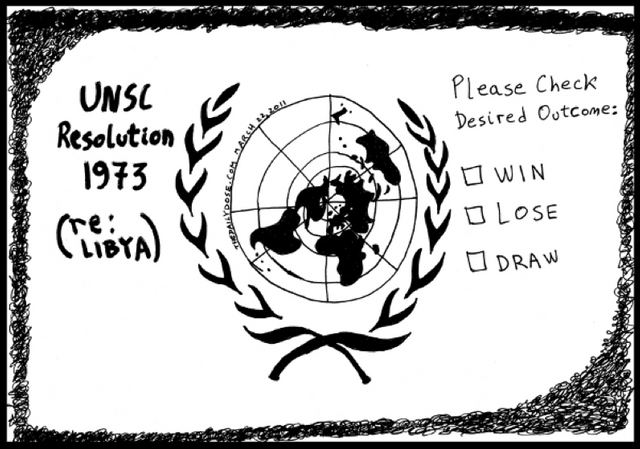NATO Intervention in Libya 2011: ANTI-WESTERN IMPERIALISM

The anti-western imperialism argument against western intervention highlighted the false humanitarian claims of the motivations of western intervention by the NATO imperial powers and argued that the intervention was not about protecting lives (Selfa, 2011a).
Western imperialism can be defined as “the projection of (European and US) state power (dominantly economic and political) from one sovereign centre into regions beyond established borders” (Kimball, 2014). It can be viewed as a system of capital accumulation that operates globally (Pradella and Rad, 2017) and necessitates political leadership and democratic institutions that coincide with western interests (Bush et al., 2011).
Many anti-imperialists on the Left, albeit not all, were against the NATO intervention because they believed that the intentions of the western governments focused primarily on establishing favorable oil contracts and imposing neoliberal policies (Selfa, 2011b and Weston, 2011). The argument that the intervention was strongly concerned the interest in oil was upheld by evidence available at the time that showed Libya was the third largest oil exporter in Africa, exporting around 85% of its refined crude oil to the EU (Bush et al., 2011). Additionally, proponents of the argument pointed out that Libya’s geopolitical importance cannot be understated, as it is positioned between the Arab monarchies with US support on one side and Iran and its allies on the other (Fermor, 2013). Many anti-interventionists were against the intervention because western military intervention would not directly concern human rights or the safety of the Libyan citizens but rather the defense of western imperial interests.
This argument is strong and can be substantiated by both theory and evidence, however, there are still some who argue that the imperial intentions have been over-stated. Many of the critiques of the anti-imperial argument surround the role of oil. According to Petras and Veltmeyer (2011: 193), “one of the most oft-repeated clichés by the Left is that the imperial invasion is about seizing control of Libya’s oil.” Although the role of oil as the sole driver of intervention should not be exaggerated, it did play a big role. When Gaddafi died and the National Transitional Council (NTC) had consolidated itself, western, Chinese and Russian investors returned to the major oil companies (Pradella and Rad, 2011). According to the NEW YORK TIMES (2011, in Pradella and Rad, 2017: 2417), the NATO intervention instigated the “scramble for access to Libya’s oil wealth.”
Pradella and Rad (2017) emphasized the connection between the European economic crisis and imperialism, showing that there is a competitive character amongst the partnership between the western imperial powers and the interests of non-imperial states such as China, competing against each other not just for access to oil but also for geopolitical control and dominance in the region.
One of the main sources corroborating this imperial motivation was the leaked intelligence brief email from Hilary Clinton’s unofficial adviser, which highlighted the west’s interest in oil and the competition for a foothold in the region (Hoff, 2016). In addition to the oil interests, the instalment of neoliberal policies was also on the rise in post-Gaddafi Libya. Naomi Klein’s (2007:9) conceptualization of “disaster capitalism” can be documented in the Libyan case, as the intervention in Libya created space for the implementation of the western free market “ideological program.” The IMF and the World Bank in cooperation with the UN mission to Libya (UNSMIL), gave the NTC recommendations to adopt development policies that would encourage privatization, reduce public sector spending and lower wages (Rand, 2013: 4).
The anti-western imperialist argument has merit because it can be corroborated by evidence and theory, and offers a valid analysis of the potential gains of intervention for imperial powers.
✅ @fleurdb, I gave you an upvote on your post! Please give me a follow and I will give you a follow in return and possible future votes!
Thank you in advance!
Hey just a quick bit of advice. Add a reference section at the base of your posts and put your full references there.
It is really good to put a introduction section that will discuss what the post is about! Cheers
Hi there, thanks for the advice. I was going to place it in the last post of the entire "paper" (the conclusion section), or do you think it is better to place it in the base of each section? Thank you for the advice!
Ha, just saw this so perhaps some repeat from the previous post. Well for one there are no rules here, really. Trying to be respectful of each other, sharing knowledge, art, music etc. For example I can just say, hey check out this cool song:
(this is actually awesome).
But with text it seems that fiction can be spread over several posts.
Non-fiction or research this is perhaps a bit harder as if each post is meant to be a discrete post, then perhaps it is best to put all of the references in the reference list for each part (i.e. each post). That way any reader can pick up your post and see the references for that post. That is perhaps what I would do as there is more utility for reader. Good luck with your research!
Hope that helps and enjoy the song.